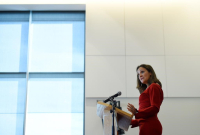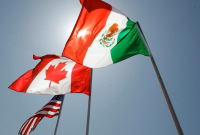Support strong Canadian climate journalism for 2025
Some of Canada's key demands in the upcoming NAFTA renegotiation will be a tough sell in the United States, according to former American trade officials who say they will be difficult to achieve in the climate of a Donald Trump, America First-themed presidency.
The Canadian government has just released priorities for the talks which begin Wednesday and they include a broad desire for four new chapters, and two specific demands: fewer Buy American rules for public contracts and freer movement of professionals.
It's the latter two some see as a long shot.
That includes a former official who oversaw procurement at the United States Trade Representative. Speaking in an interview a few days before Canada formally announced its positions, Stephen Kho explained why it's always been difficult to extend free trade in procurement to the state and local level, as Canada wants.
Canada has long desired a similar level of access to contracts at the subnational level that it enjoys at the federal level — and it mostly failed to get that in negotiations for the now-stalled Trans-Pacific Partnership.
Kho says he doesn't see how this changes now.
American politics is moving in the opposite direction: Trump was elected on a promise to increase Buy American rules, not reduce them; it's even a stated U.S. priority for the new NAFTA; the opposition is also with Trump on this, with Democratic lawmakers calling for NAFTA to allow less foreign procurement, not more.
"It might be a problem," said Kho, who was lead counsel on Buy American/procurement issues at USTR and now works at the Akin Gump firm.
"It's particularly going to be true of the Trump administration. It's made it a point, very publicly, of tightening up the exceptions rules, waivers ... (and proclaiming) America First. That will make it particularly difficult — and it's difficult already."
He said it's always good to talk about new ideas, but: "I don't think expectations should be too high for this being liberalized further."
Canada announced that more liberalized procurement would be a priority, in a speech Monday by Foreign Affairs Minister Chrystia Freeland in which on the eve of her departure to Washington for round one of the NAFTA talks, she laid out about 10 priorities.
She referred to the economic argument against buy-local rules.
"Local-content provisions for major government contracts are political junk food: superficially appetizing, but unhealthy in the long run," Freeland said.
The basic argument against these provisions is they drive up the cost of projects — so taxpayers pay more, they get fewer new roads and bridges for their money, that reduces economic activity and in the long run it doesn't save the economy any jobs.
But it's politically popular.
Polls show huge voter support for buy-local policies amongst Americans, although more detailed polling has, on the other hand, shown that voters prefer getting a bargain to paying more for a product just because it's made at home.
Professional visas was another of the more detailed priorities Freeland mentioned.
What Canada wants is changes to a NAFTA jobs list which allows some people to more easily get a visa to work across the border.
The jobs list is old and outdated. It mentions land surveyors and range conservationists, for instance, but not computer programmers. International companies want that jobs list in Chapter 16 expanded to make it easier for employees to move between offices.
Robert Holleyman, former deputy U.S. trade czar to Barack Obama, says any changes to labour mobility could prove difficult. In an interview several days ago, before Freeland spoke, he predicted worker mobility might get swept into the turbulent U.S. immigration debate.
That immigration issue has been fought to a stalemate in the American Congress. Congressional paralysis on immigration-related reforms is one reason that NAFTA list has never been updated.
And the mood in Congress matters: in the end, it will have to vote on any NAFTA deal.
"I think any question that deals with mobility of persons will be very difficult for the U.S. to do," said Holleyman, who is now president of C&M International.
"I think it would be, in any case — but particularly in the context of the current debates about immigration. I suspect that'll be very difficult for the U.S. to do."





Comments